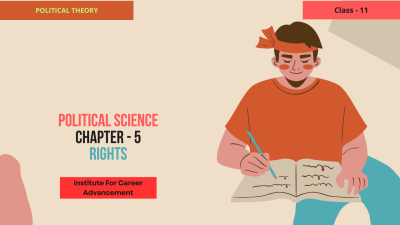Rights - Class 11

₹299
Rights are fundamental entitlements or claims that individuals have by virtue of being human. They are essential for human dignity, development, and well-being. Rights can be categorized into various types: Natural rights: Inherent rights that individuals possess by virtue of being human, regardless of any legal or social system. Legal rights: Rights that are granted by law and are enforceable through legal processes. Human rights: Fundamental rights that all individuals are entitled to, regardless of their nationality, race, gender, religion, or any other status. Civil rights: Rights that protect individuals from discrimination and ensure their equal participation in society. Political rights: Rights that enable individuals to participate in the political process, such as the right to vote, hold office, and express opinions. Economic rights: Rights that ensure individuals have access to basic economic resources and opportunities, such as the right to work and the right to education. Social rights: Rights that ensure individuals have access to essential social services, such as healthcare, housing, and education. Importance of rights: Human dignity: Rights are essential for upholding human dignity and ensuring that all individuals are treated with respect. Development: Rights are essential for human development, as they enable individuals to realize their full potential. Justice: Rights promote justice by ensuring that all individuals are treated fairly and equally. Equality: Rights are essential for promoting equality and ensuring that all individuals have equal opportunities. Social harmony: Rights contribute to social harmony by promoting understanding, tolerance, and cooperation. Democratic values: Rights are essential for democratic societies, as they ensure that individuals have a voice in the governance of their country. Challenges to rights: Violations: Rights can be violated by individuals, governments, or other organizations. Discrimination: Discrimination based on factors such as race, gender, religion, or socioeconomic status can hinder the enjoyment of rights. Inequality: Inequality in wealth, education, and opportunities can limit access to rights. Political marginalization: Certain groups may be excluded from political processes, limiting their ability to influence policy decisions. Economic disparities: Economic disparities can create unequal opportunities and access to resources. Promoting rights requires a multifaceted approach that includes: Legal reforms: Laws and policies that protect and promote rights. Social reforms: Programs and initiatives that address discrimination and inequality. Economic policies: Policies that promote economic growth and reduce inequality. Political reforms: Measures that ensure that all individuals have equal access to political participation. Education and awareness: Raising awareness about the importance of rights and promoting education on human rights. International cooperation: Working with other countries to promote and protect human rights globally. By addressing these challenges and promoting rights, societies can create a more just, equitable, and inclusive world. অধিকার হল মৌলিক অধিকার বা দাবি যা মানুষ হওয়ার কারণে ব্যক্তিদের রয়েছে। এগুলি মানুষের মর্যাদা, উন্নয়ন এবং কল্যাণের জন্য অপরিহার্য। অধিকারকে বিভিন্ন শ্রেণীতে ভাগ করা যেতে পারেঃ প্রাকৃতিক অধিকারঃ যে কোনও আইনি বা সামাজিক ব্যবস্থা নির্বিশেষে মানুষ হওয়ার কারণে ব্যক্তিরা যে অন্তর্নিহিত অধিকারের অধিকারী। আইনি অধিকারঃ আইন দ্বারা প্রদত্ত এবং আইনি প্রক্রিয়ার মাধ্যমে প্রয়োগযোগ্য অধিকার। মানবাধিকারঃ মৌলিক অধিকার যা সমস্ত ব্যক্তি তাদের জাতীয়তা, জাতি, লিঙ্গ, ধর্ম বা অন্য কোনও মর্যাদা নির্বিশেষে পাওয়ার অধিকারী। নাগরিক অধিকারঃ এমন অধিকার যা ব্যক্তিদের বৈষম্য থেকে রক্ষা করে এবং সমাজে তাদের সমান অংশগ্রহণ নিশ্চিত করে। রাজনৈতিক অধিকারঃ এমন অধিকার যা ব্যক্তিদের রাজনৈতিক প্রক্রিয়ায় অংশগ্রহণ করতে সক্ষম করে, যেমন ভোট দেওয়ার অধিকার, পদে অধিষ্ঠিত হওয়া এবং মতামত প্রকাশের অধিকার। অর্থনৈতিক অধিকারঃ এমন অধিকার যা ব্যক্তিদের মৌলিক অর্থনৈতিক সম্পদ এবং সুযোগের অ্যাক্সেস নিশ্চিত করে, যেমন কাজের অধিকার এবং শিক্ষার অধিকার। সামাজিক অধিকারঃ এমন অধিকার যা স্বাস্থ্যসেবা, আবাসন এবং শিক্ষার মতো প্রয়োজনীয় সামাজিক পরিষেবাগুলিতে ব্যক্তির প্রবেশাধিকার নিশ্চিত করে। অধিকারের গুরুত্বঃ মানব মর্যাদাঃ মানবাধিকার মানুষের মর্যাদা বজায় রাখার জন্য এবং সকল ব্যক্তির প্রতি সম্মানের সাথে আচরণ নিশ্চিত করার জন্য অপরিহার্য। উন্নয়নঃ মানুষের উন্নয়নের জন্য অধিকার অপরিহার্য, কারণ এগুলি ব্যক্তিদের তাদের পূর্ণ সম্ভাবনা উপলব্ধি করতে সক্ষম করে। ন্যায়বিচারঃ অধিকার সকল ব্যক্তির সঙ্গে ন্যায্য ও সমান আচরণ নিশ্চিত করে ন্যায়বিচারের প্রসার ঘটায়। সমতাঃ সমতার প্রচার এবং সকল ব্যক্তির সমান সুযোগ নিশ্চিত করার জন্য অধিকার অপরিহার্য। সামাজিক সম্প্রীতিঃ অধিকারগুলি বোঝাপড়া, সহনশীলতা এবং সহযোগিতা বৃদ্ধির মাধ্যমে সামাজিক সম্প্রীতির ক্ষেত্রে অবদান রাখে। গণতান্ত্রিক মূল্যবোধঃ গণতান্ত্রিক সমাজের জন্য অধিকার অপরিহার্য, কারণ তারা নিশ্চিত করে যে তাদের দেশের শাসনে ব্যক্তিদের একটি কণ্ঠস্বর রয়েছে। অধিকারের চ্যালেঞ্জঃ লঙ্ঘনঃ ব্যক্তি, সরকার বা অন্যান্য সংস্থার দ্বারা অধিকার লঙ্ঘিত হতে পারে। বৈষম্যঃ জাতি, লিঙ্গ, ধর্ম বা আর্থ-সামাজিক অবস্থানের মতো বিষয়গুলির উপর ভিত্তি করে বৈষম্য অধিকারের উপভোগকে বাধা দিতে পারে। অসমতাঃ সম্পদ, শিক্ষা এবং সুযোগের অসমতা অধিকারের প্রাপ্যতা সীমিত করতে পারে। রাজনৈতিক প্রান্তিকীকরণঃ কিছু গোষ্ঠীকে রাজনৈতিক প্রক্রিয়া থেকে বাদ দেওয়া হতে পারে, যা তাদের নীতিগত সিদ্ধান্তগুলিকে প্রভাবিত করার ক্ষমতাকে সীমাবদ্ধ করে। অর্থনৈতিক বৈষম্যঃ অর্থনৈতিক বৈষম্য অসম সুযোগ এবং সম্পদের প্রাপ্যতা তৈরি করতে পারে। অধিকারের প্রচারের জন্য একটি বহুমুখী পদ্ধতির প্রয়োজন যার মধ্যে রয়েছেঃ আইনি সংস্কারঃ আইন ও নীতি যা অধিকার রক্ষা ও প্রচার করে। সামাজিক সংস্কারঃ বৈষম্য ও বৈষম্য দূর করার কর্মসূচি ও উদ্যোগ। অর্থনৈতিক নীতিঃ এমন নীতি যা অর্থনৈতিক প্রবৃদ্ধিকে উৎসাহিত করে এবং বৈষম্য হ্রাস করে। রাজনৈতিক সংস্কারঃ এমন পদক্ষেপ যা নিশ্চিত করে যে সমস্ত ব্যক্তির রাজনৈতিক অংশগ্রহণের সমান সুযোগ রয়েছে। শিক্ষা ও সচেতনতাঃ অধিকারের গুরুত্ব সম্পর্কে সচেতনতা বৃদ্ধি এবং মানবাধিকার বিষয়ে শিক্ষার প্রচার করা। আন্তর্জাতিক সহযোগিতাঃ বিশ্বব্যাপী মানবাধিকারের প্রচার ও সুরক্ষার জন্য অন্যান্য দেশের সাথে কাজ করা। এই চ্যালেঞ্জগুলির মোকাবিলা করে এবং অধিকারের প্রচারের মাধ্যমে, সমাজগুলি আরও ন্যায়সঙ্গত, ন্যায়সঙ্গত এবং অন্তর্ভুক্তিমূলক বিশ্ব তৈরি করতে পারে।
Learn more
 0
0 